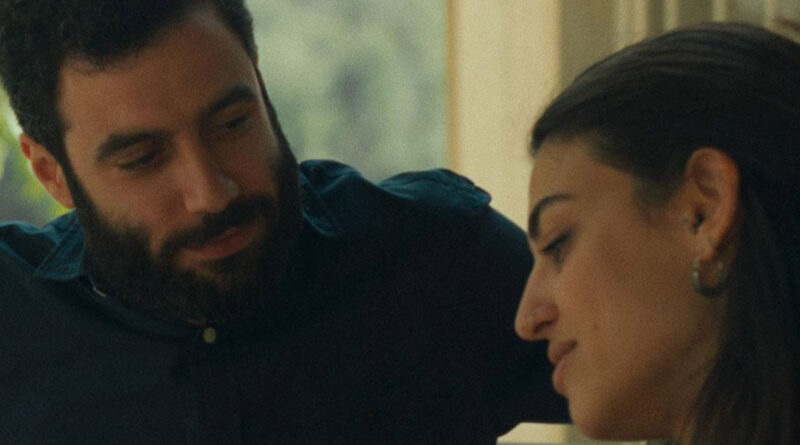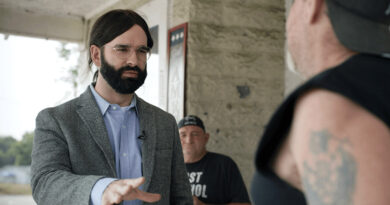A Tense Exploration of Forbidden Love in a Divided Nation: Scandal Copti’s Happy Holidays
In Happy Holidays, Palestinian director Scandal Copti weaves a gripping, high-stakes drama around the forbidden relationship between Rami (Toufik Daniel), a Palestinian, and Shirley (Shani Dahari), an Israeli. The story delves into the complexities of their interracial relationship in a country deeply divided by national and religious identities. When Shirley becomes pregnant, the couple faces not only personal turmoil but the harsh realities of living in a society that won’t accept their union. Rami pleads with Shirley to consider an abortion, but she refuses, setting off a chain of events that highlight the fractures within their relationship.
Exploring the Power of State and Relationships
In Happy Holidays, Copti examines how the state’s power and division influence personal relationships. His portrayal is nuanced and insightful, capturing the tension between personal freedom and societal expectations in an increasingly militarized Israel. Much like his previous work Ajami, co-directed with Israeli filmmaker Yaron Shani, Copti delves into the subtle dynamics of life in a fractured nation. He examines how relationships either question or reflect the will of the state and how patriarchal and state forces often reshape or even destroy them.
Compelling Performances Drive the Drama
The emotionally charged performances of the cast, made up mostly of non-professional actors, ground the film in a raw portrayal of Jewish Israelis and Palestinian Christians grappling with existential questions. Rami and Shirley’s relationship begins to unravel as anonymous threats strain their bond. While Rami suspects Shirley’s family, Shirley believes Rami is behind the warnings. The film maintains a strong sense of suspense, though it could have benefited from more backstory about how Rami and Shirley began their relationship, given the film’s focus on the taboo nature of their romance.
Fifi’s Storyline and the Complexity of Family Dynamics
Parallel to the central storyline is that of Rami’s sister, Fifi (Manar Shehab), who harbors secrets of her own. After being hospitalized following a car accident, Fifi’s private life starts to unravel, including aspects of her sexual history she would prefer to keep hidden. Copti skillfully uses Fifi’s experiences to reflect broader societal constraints, as her efforts to negotiate privacy with the hospital’s medical staff highlight the restrictions placed on women in patriarchal societies.
Challenging Notions of Chastity and Tradition
Fifi’s boyfriend, Walid (Raed Barbara), is another key player in the story, and his courtship of Fifi hinges on outdated notions of chastity. Meanwhile, Fifi’s mother, Hana (Wafaa Aoun), grapples with financial struggles while planning her other daughter Leila’s wedding. The family’s descent into financial uncertainty due to accounting fraud adds another layer of tension to the story. At the same time, Shirley’s sister Miri (Merav Mamorski) deals with her daughter’s sudden depression, adding to the film’s examination of family pressure and societal expectations.
A Candid Look at Israeli Society
Copti’s portrayal of daily life in Haifa adds depth to the film’s narrative, particularly through scenes like Fifi’s work at a primary school, where Israeli children are taught to write letters to soldiers and reinforce anti-Arab sentiments. The film paints a stark picture of how nationalism and militarism are ingrained into the nation’s identity, creating further division among its people.
A Web of Interconnected Stories
Through hyperlinked stories, Happy Holidays provides concrete examples of interdependence within a divided society. Copti reminds viewers that none of us are truly free until we all are. His frank and candid storytelling leaves an emotional impact as he presents the challenges faced by Palestinians and Israelis under the weight of national and personal conflict.
Conclusion: A Powerful Meditation on Relationships and Identity
Scandal Copti’s Happy Holidays is an emotionally intense and intellectually charged film that tackles the difficult realities of forbidden love, family dynamics, and the intersection of personal identity and state power. With powerful performances and an intricately woven narrative, the film is poised to resonate with audiences around the world.
Full Credit
Venue: Venice Film Festival (Orizzonti)
Production Companies: Fresco Films, Red Balloon Film, Tessalit Productions, Intramovies
Cast: Manar Shehab, Wafa Aoun, Toufik Daniel, Merav Mamorski
Director and Screenwriter: Scandal Copti
Producers: Toni Copty, Gillies Copti, Dorothée Beinemeyer, Jean Blair, Bertrand Faivre, Emma Binet, Marco Valerio Fusco, Micaela Fusco
Director of Photography: Tim Kuhn
Production Designer: Stella Rossier
Costume Designer: Hamada Atallah
Editor: Scandal Copti
Sound: Maximilien Gobier, Pierre Toucat, Matthias Schwab
Sales: Indie Sales
Languages: Arabic, Hebrew
Runtime: 2 hours 4 minutes




